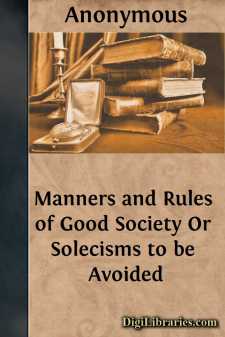Categories
- Antiques & Collectibles 13
- Architecture 36
- Art 48
- Bibles 22
- Biography & Autobiography 813
- Body, Mind & Spirit 142
- Business & Economics 28
- Children's Books 15
- Children's Fiction 12
- Computers 4
- Cooking 94
- Crafts & Hobbies 4
- Drama 346
- Education 46
- Family & Relationships 57
- Fiction 11829
- Games 19
- Gardening 17
- Health & Fitness 34
- History 1377
- House & Home 1
- Humor 147
- Juvenile Fiction 1873
- Juvenile Nonfiction 202
- Language Arts & Disciplines 88
- Law 16
- Literary Collections 686
- Literary Criticism 179
- Mathematics 13
- Medical 41
- Music 40
- Nature 179
- Non-Classifiable 1768
- Performing Arts 7
- Periodicals 1453
- Philosophy 64
- Photography 2
- Poetry 896
- Political Science 203
- Psychology 42
- Reference 154
- Religion 513
- Science 126
- Self-Help 84
- Social Science 81
- Sports & Recreation 34
- Study Aids 3
- Technology & Engineering 59
- Transportation 23
- Travel 463
- True Crime 29
Manners and Rules of Good Society Or Solecisms to be Avoided
by: Anonymous
Description:
Excerpt
The title of this work sufficiently indicates the nature of its contents. The Usages of Good Society relate not only to good manners and to good breeding, but also to the proper etiquette to be observed on every occasion.
Not only are certain rules laid down, and minutely explained, but the most comprehensive instructions are given in each chapter respecting every form or phase of the subject under discussion that it may be clearly understood what is done, or what is not done, in good society, and also how what is done in good society should be done. It is precisely this knowledge that gives to men and women the consciousness of feeling thoroughly at ease in whatever sphere they may happen to move, and causes them to be considered well bred by all with whom they may come in contact.
A solecism may be perhaps in itself but a trifling matter, but in the eyes of society at large it assumes proportions of a magnified aspect, and reflects most disadvantageously upon the one by whom it is committed; the direct inference being, that to be guilty of a solecism argues the offender to be unused to society, and consequently not on an equal footing with it. This society resents, and is not slow in making its disapproval felt by its demeanour towards the offender.
Tact and innate refinement, though of the greatest assistance to one unused to society, do not suffice of themselves; and although counting for much, cannot supply the want of the actual knowledge of what is customary in society. Where tact and innate refinement do not exist—and this is not seldom the case, as they are gifts bestowed upon the few rather than upon the many—then a thorough acquaintance with the social observances in force in society becomes more than ever necessary, and especially to those who, socially speaking, are desirous of making their way in the world.
Those individuals who have led secluded or isolated lives, or who have hitherto moved in other spheres than those wherein well-bred people move, will gather all the information necessary from these pages to render them thoroughly conversant with the manners and amenities of society.
This work will be found of equal service to both men and women, as in each chapter the points of social etiquette to be observed by both sexes have been fully considered.
Those having the charge of young ladies previous to their introduction into society, either mothers, chaperons, or governesses, will also derive much useful and practical information from the perusal of this work, while to those thoroughly versed in the usages of society it cannot fail to commend itself, containing as it does many useful and valuable hints on social questions.
MANNERS AND RULES OF GOOD SOCIETY
———♦———
THE MEANING OF ETIQUETTE
What is etiquette, and what does the word convey? It is a poor one in itself, and falls very far short of its wide application. It has an old-fashioned ring about it, savouring of stiffness, primness, and punctiliousness, which renders it distasteful to many possessing advanced ideas; and yet the word etiquette is not so very old either, as Johnson did not include it in his dictionary, and Walker apologises for introducing it into his, and according to the authorities he quotes, it is supposed to be derived from stichos, stichus, stichetus, sticketta, and from thence to etiquette....












